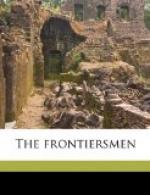Thus it was that Digatiski, the Hawk, of Eupharsee Town, long the terror of the southern provinces, must needs sit idle, forlorn, frenzied with rage and grief, in a remote and lofty cavity of a great cliff, and looking out over range and valley and river of this wild and beautiful country, see fire and sword work their mission of destruction upon it. By day a cloud of smoke afar off bespoke the presence of the soldiery. At night a tremulous red light would spring up amidst the darkness of the valley, and expanding into a great yellow flare summon mountains and sky into an infinitely sad and weird revelation of the landscape, as the great storehouses of corn were burned to the ground, leaving the hapless owners to starvation.
His pride grudged his very eyes the sight of this humiliation, for despite the oft-repeated assertion of the improvidence of the Indian character, these public granaries, whence by the primitive Cherokee government food was dispensed gratis to all the needy, were always full, and their destruction meant national annihilation or subjugation. After one furtive glance at the purple obscurities of the benighted world he would bow his head, and with a smothered groan ask of the ada-wehi, “Where is it now, Attusah?”
The young warrior, half reclining at the portal of the niche, would lift himself on one elbow,—the glow of the little camp-fire within the recess on his feather-crested head, his wildly painted face, the twenty strings of roanoke passed tight like a high collar around his neck, thence hanging a cascade of beads over his chest, the devious arabesques of tattooing on his bare, muscular arms, the embroideries of his buckskin raiment and gaudy quiver,—and searching with his gay young eyes through the stricken country reply, “Cowetchee,” “Sinica,” “Tamotlee,” whichever town might chance to be in flames.
Doubtless Attusah realized equally the significance of the crisis. But a certain joyous irresponsibility characterized him, and indeed he had never seemed quite the same since he died. He had been much too reckless, however, even previous to that event. Impetuous, hasty, tumultuously hating the British colonists, he had participated several years earlier in a massacre of an outlying station, when the Cherokees were at peace, without warrant of tribal authority, and with so little caution as to be recognized. For this breach of the treaty his execution was demanded by the Royal Governor of South Carolina, and reluctantly conceded by the Cherokees to avert a war for the chastisement of the tribe. Powder must have been exceedingly scarce!
Attusah was allowed to choose his method of departure to the happy hunting-grounds, and thus was duly stabbed to death. He was left weltering in his blood to be buried by his kindred. The half king, Atta-Kulla-Kulla, satisfied of his death, himself reported the execution to the Carolina authorities, and as in his long and complicated diplomatic relations with the colonial government this Cherokee chief had never broken faith, he was implicitly believed.




